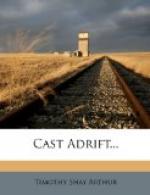Mr. Dinneford took Edith’s letter from the floor, where it had dropped from his wife’s hand, and withdrew from her presence. She arose quickly as he did so, crossed the room and silently turned the key, locking herself in. Then her manner changed; she moved about the room in a half-aimless, half-conscious way, as though some purpose was beginning to take shape in her mind. Her motions had an easy, cat-like grace, in contrast with their immobility a little while before. Gradually her step became quicker, while ripples of feeling began to pass over her face, which was fast losing its pallor. Gleams of light began shooting from her eyes, that were so dull and stony when her husband found her with Edith’s letter crushed in her grasp. Her hands opened and shut upon themselves nervously. This went on, the excitement of her forming purpose, whatever it was, steadily increasing, until she swept about the room like a fury, talking to herself and gesticulating as one half insane from the impelling force of an evil passion.
“Baffled, but not defeated.” The excitement had died out. She spoke these words aloud, and with a bitter satisfaction in her voice, then sat down, resting her face in her hands, and remaining for a long time in deep thought.
When she met her husband, an hour afterward, there was a veil over her face, and he tried in vain to look beneath it. She was greatly changed; her countenance had a new expression—something he had never seen there before. For years she had been growing away from him; now she seemed like one removed to a great distance—to have become almost stranger. He felt half afraid of her. She did not speak of Edith, but remained cold, silent and absorbed.
Mrs. Dinneford gave no sign of what was in her heart for many weeks. The feeling of distance and strangeness perceived by her husband went on increasing, until a vague feeling of mystery and fear began to oppress him. Several times he had spoken of Edith, but his wife made no response, nor could he read in her veiled face the secret purposes she was hiding from him.
No wonder that Mr. Dinneford was greatly surprised and overjoyed, on coming home one day, to meet his daughter, to feel her arms about his neck, and to hold her tearful face on his bosom.
“And I’m not going away again, father dear,” she said as she kissed him fondly. “Mother has sent for me, and George is to come. Oh, we shall be so happy, so happy!”
And father and daughter cried together, like two happy children, in very excess of gladness. They had met alone, but Mrs. Dinneford came in, her presence falling on them like a cold shadow.
“Two great babies,” she said, a covert sneer in her chilling voice.
The joy went slowly out of their faces, though not out of their hearts. There it nestled, and warmed the renewing blood. But a vague, questioning fear began to creep in, a sense of insecurity, a dread of hidden danger. The daughter did not fully trust her mother, nor the husband his wife.




